Noonee Doronila: My parents were never people who thought that we would be migrating to any country.
My father was one of the well-known journalists in the Philippines. He was a political journalist, but because of martial law he was detained, he was imprisoned for 3 months. And he couldn't practice journalism in the country, unless he would work for the government newspaper. And he refused to do that.
It was a weird period of time I think, if you can say that. Your speech is controlled. Everything is controlled ... You just don't talk to anyone basically. You start getting scared about seeing people who have military uniforms, you know. Because we also had curfews so, you know, there's this whole sense of threat.
He didn't want to compromise his ... political views and his ... ideas of freedom and independence. You know, if he stayed in the Philippines. He did not want to compromise that. And up to today I feel that's really been a strong part of who I am as a person and the way my family is, as they are and my brothers as well.
Erfan Daliri: My father was 18 years old when he was imprisoned in Iran for being a Bahai. He was kept in prison for a while and tortured because of his religious beliefs.
When he got out of prison he decided he was gonna leave his family behind and move to India independently. So he moved to India and started studying there, and then when the Iranian Revolution was about to happen, my mother's family all decided to move to India as well. So my parents met in in India. They got married and soon after I was born they moved to Australia.
My father moved to India and then my mother a few years later. Basically, their citizenship in Iran was cancelled because they basically left illegally. India would not provide them with citizenship at the time. So they couldn't go back to Iran, didn't want to go back to Iran, and they needed to get citizenship in a new country. So they basically applied to the United Nations claiming refugee status. When the response came back they had the choice of picking between 3 countries and Australia happened to be that country.
In the meantime they were stateless basically, so when I was born I wasn't an Indian and I wasn't an Iranian because I wasn't allowed citizenship in India and I'd never been to Iran. So it wasn't until my parents were given a visa to travel to Australia and then citizenship in Australia that I actually had a nationality. Up until that point I was just an Indian-born refugee of Iranian parents.
Sofia Kallos: When the Civil War started, the Communists, they will come down and get whatever you had. Animals, whatever you had. It was a terrible thing then. So we have to migrate from our little village to go to another, bigger town. To get away from the guerrillas, let's put it that way. And then after when they finish, the people come back to their own little villages. They have to start all over again.
I was 16 actually, when I heard about Australia and people are migrating to Australia. People are getting for better life. That was the word ... come out to say 'that's better life' to go there.
Seraphin Nyirenda: l used to be a radio reporter – journalist. It was hard, it was hard.
You experienced, say death, you experienced, you were there. You saw somebody killing someone. But you can't talk about it, because that person maybe is from the government, or from the opposition. So whenever you say thing you have to measure up. You have to know is this really what I have to do? Or you have to report first to the authority, but you witness it.
I'm telling you it's very hard. Your life will be in danger. You just heard the news, 'Some people are looking for you man, you have to be careful.' Simple, you know. I was under obligation to leave behind my family, and run away from my country. Just as I was. With only your clothes, no bag, no document, no nothing.
My wife, I told her 'Look you have to run away from that country because it's not safe for you. As long as I'm not there, you too, you are not gonna be safe, so you have to run away.'
We plan that she went to refugee camp in Malawi. Then from there she applied to the UNHCR [United Nations High Commissioner for Refugees] refugee. They approve her story based on my story.
Joseph Assaf: Like many Lebanese I wanted to migrate, but I wanted to migrate to an English-speaking country. So I decided to lodge an application at the Australian Consulate, one at the American and one at the Canadian. And I told myself that whichever comes first, I will take.
I think it was more a call for adventure. It was the adventure. I wanted to go somewhere ... somewhere new, especially after the death of my brother. I wanted something totally new. A new country, new language, new environment. And Australia was the one, I mean, I was destined to come here.

